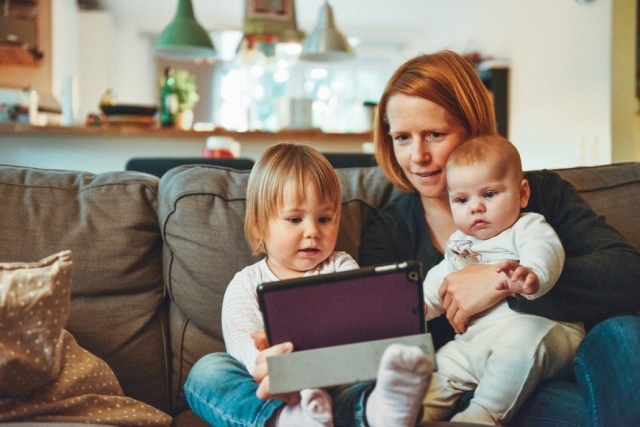
The new rite of passage that initiates our children into a “I know you’re responsible enough now” phase is giving them a smartphone. And what choice do we have? It’s impossible to survive out there after a certain age without using mobile devices.
You have the choice of never handing your children a phone at any age thinking you are protecting them while everyone else their age owns a phone and uses it successfully, or you can give them their first phone when signs of maturity and understanding start to appear and they seem ready to handle this responsibility.
Your job, in this case, is to make sure they realise the dangers that come with it, they are educated on the ins and outs of the online world, and that they are fully competent and capable of not just protecting themselves against them but also protecting their peers by spreading awareness and warning them against misuse. How can you achieve that as a parent of the 21st century?
Ask yourself

Is my child ready?
Does the kiddo still have difficulty reaching the kitchen tap? Then no, they are not ready. Firstly, giving any kind of independent use of mobile phones when your child is still not able to make out the letters of the alphabet is a BIG NO. They can’t hold toys properly yet and you want them to hand over these devices with the capacity to make or break a person’s life with endless addictions, detrimental habits, sleep deprivation, loss of focus and concentration, and many more problems? We as adults with fully matured minds, who didn’t grow up with technology, have many of these difficulties plaguing us. We don’t think any parent wishes for their children’s youngest and brightest years to be riddled with these issues, or for any stage of their life for that matter.
Giving your children smartphones in their tiny hands at such a tender age is not going to turn out well. From the age of six onwards, you can slowly start teaching them about different functions. Let them learn how to call Grandma and wish her a happy holiday. Basic functions like calling and messaging can be taught around the age of 6-7 and onwards, with, of course, your adult supervision. It should be clear to little ones that they are not to touch the phone in your absence.
When to consider buying your child their first smartphone?

By the time they enter their early teens, 12 or 13 years of age, you’re going to hear a whole lot of nagging about “my friends have it, and I don’t!”. Instead of giving in to the impulse and buying them a phone to keep them quiet and off your back, take the time to analyse your kid’s behaviour and appraise if they are ready to handle that responsibility. Better yet, give them a chance to prove themselves. This will nurture your parent-child bond.
Give them roles and responsibilities and see if they can fulfill them duly. Remember, the task’s success doesn’t matter; it’s the effort and willingness your child is going to exert. If they show strong determination to be dutiful, they are likely ready. If that’s not the case, it’s your job as the parent to prepare them, as one day the little bird’s going to leave the nest. Better make sure they know how to survive out there. Now that you have finally decided to buy your child their first smartphone, this brings us to the main topic.
Safety tips before you get your child their first smartphone

Educate the child on the use and dangers of the mobile phone
Smartphones have immense potential. They can be used in every and any way. You can know how your child is doing while they are away from home. Location tracking is also possible. Communication in times of emergency is always a need. The massive archive of information that the Internet provides can be used for school assignments. These are some of the initial reasons you should be getting your child a smartphone in the first place.
But with use, there is also potential for misuse. Cyberbullying and online harassment are most prevalent among teens. One misstep and your entire child’s personal information can be parcelled off to an unauthorised entity, which will, for certain, bring your child in harm’s way. Educating your child on how to use the phone for good and what to avoid is the right first step. Teach them to keep their accounts private and not disclose personal information. If a suspicious person is trying to contact them, you can use Nuwber to check the identity of that person and see all publicly available information on them.
Establish a mutual understanding

Your child needs to have it clear what you expect of them and how you want them to use their phone. They should know that you can check their phones any time you wish and that if you find something impermissible, there will be consequences. At the same time, in case it happens, taking away the phone, shouting, or punishing is not the right thing to do. Let them understand that they can keep the phone and that you trust them. Delegate responsibility on them so they always strive to be better versions of themselves.
Device specifications
Standard features like a decent front and rear camera, hardware capacity, large storage, powerful processing power, battery capacity, and average screen size are some essential features that modern phones need to have, regardless of the user’s age.
Buy the smartphone with the most optimal specifications that cater to the current use by your child.
Parental settings
When you buy them the phone, don’t let them have it straight out of the box. Take the time to figure out the settings yourself, and set up an efficient parental app. Phones come with built-in vanilla parental settings, but some custom apps offer much greater potential.
You can know exactly which number calls them, what they browse on the internet, limit app access, and even lock them out of the device if you see a need. As mentioned, the potential is great.









